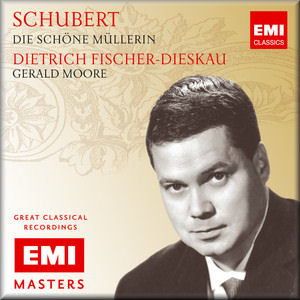It seems to be almost a sin that we don’t already have
a review of this recording - in one of its previous incarnations
- here on MusicWeb International. This is arguably the best
recording of this work, and one of the finest of Fischer-Dieskau’s
many recordings. I’ve always had a weakness for this work,
compared to, say, Winterreise, because of the many beautiful
melodies and the overall tone of the work. Sure, it’s
a typically German-romantic story of love, loss and suicide,
but in spite of this, it remains an immensely attractive group
of songs.
This version, unlike most recordings, begins with Der Dichter,
Als Prolog (The Poet’s Prologue), a spoken text that
starts as follows:
“Fair ladies, wise gentlemen,
and all who enjoy a good spectacle,
I invite you to a brand-new entertainment
in an absolutely brand-new style.
Simply fashioned, artlessly arranged,
adorned with noble German simplicity,
as jaunty as a lad with his lover’s bouquet;
and there’s also a little pious humility for the audience.
For me that’s enough of a recommendation; if you too like
the sound of it, then come in.”
It also ends with Epilog, another spoken text summing
up the work:
“So all that remains for me to do
is to end by wishing you good night.
And if you wish to dream a light dream,
when you shut your eyes for a long night’s sleep,
think of the mill-wheel and the foaming water
until your head whirls;
and if you lead a maiden by the hand,
ask for a pledge of love in parting,
and if today she gives you what she has often denied,
think faithfully of the faithful miller.
At every squeeze of the hand, at every kiss,
at every passionate surge of the heart,
grant him love for his brief sorrow,
grant him lasting bliss in your hearts.”
These two texts frame the story quite well, and Fischer-Dieskau
reads them in dramatic style to set the tone at the beginning,
then sum up the work at the end. Of the recordings I know only
this one, and Ian Bostridge’s recording for Hyperion,
contain these texts. (Bostridge’s actually contains other
poems interspersed with the music as well, read by Fischer-Dieskau.)
You may not want to listen to them each time you listen to the
work, but it’s important to be aware of them.
Fischer-Dieskau was in his prime in 1961, when this was recorded,
and this is arguably his finest period. While he may have had
greater experience and mastery in the 1970s, when he recorded
all of Schubert’s lieder for male voice for DG, the EMI
recordings of this era show a singer full of exuberance and
energy, forging his style, and refining his technique. When
I hear Fischer-Dieskau sing Ungeduld, and particularly
the line, “Dein ist mein Herz”, I cannot helped
but be moved by the sincerity in his singing. His purity of
tone comes through in every song, from the dainty Des Müllers
Blumen to the subtle, pretty Pause, where his flexibility
highlights the words, or in the rapid, almost pizzicato Der
Jäger, where the singer changes from his wondrous pleasure
to anger. His wears his emotion on his sleeve in Die liebe
Farbe, when he sings of digging his grave in the turf, and
the closing Des Baches Wiegenlied is intensely moving.
The sound of this recording is good but not great. Even after
a re-mastering in 1997 (this version is just a new release of
that same disc in a different package and with a different cover),
there is a slightly muffled effect overall, with the piano sounding
especially weak in the background. The sound-space has Fischer-Dieskau
to the right of centre and the piano to the left, which works
well on speakers, but not so well on headphones. The sound volume
is surprisingly low compared to other recordings, and some of
the pauses between songs seem just a bit short.
While I have a dozen recordings of this song-cycle, this is
the one I return to most often. It’s great to see it put
in the forefront again in EMI’s new EMI Masters series,
and I hope that those who don’t know this work will discover
it through this disc.
Kirk McElhearn


 All Nimbus reviews
All Nimbus reviews














